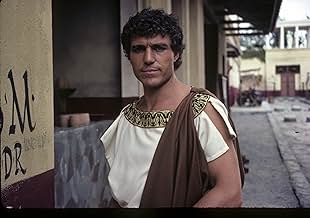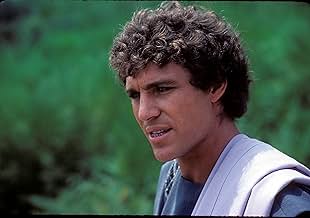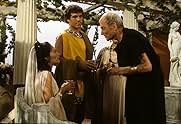IMDb-BEWERTUNG
7,0/10
668
IHRE BEWERTUNG
Füge eine Handlung in deiner Sprache hinzuRich residents of Pompeii enjoy luxury life until Vesuvius erupts, burying the city. inhis daughter Julia, cultured Greek Glaucus, gladiator Lydon, nobles Antonius and Ione, villainous pries... Alles lesenRich residents of Pompeii enjoy luxury life until Vesuvius erupts, burying the city. inhis daughter Julia, cultured Greek Glaucus, gladiator Lydon, nobles Antonius and Ione, villainous priest Arbaces, and persecuted Christian slaves.Rich residents of Pompeii enjoy luxury life until Vesuvius erupts, burying the city. inhis daughter Julia, cultured Greek Glaucus, gladiator Lydon, nobles Antonius and Ione, villainous priest Arbaces, and persecuted Christian slaves.
Folgen durchsuchen
Empfohlene Bewertungen
10s-cools
I've read the novel written by Bulwer Lytton, I visited Pompeii about 5 times and have read scores of books on the city and its dramatic destruction. This is the best screen adaptation of the book so far. It sticks quite well to Bulwer's novel and adds quite a few pleasant characters and events. Of course this mini-series is not perfect, even has countless flaws : the Temple of Isis, the houses of Glaucus and Diomedes come directly out of the set-designers' imagination, sending Christians to the lions is a bit too cliché, some aspects of the novel have been changed to make it all more dynamic (the novel is very slow-paced actually). But all in all, the plot is interesting, changes and additions good. Nead Beatty's portrayal of Diomedes is just brilliant!! Lesley-Ann Down is gorgeous as Chloe... The day this mini-series comes out on DVD, I'll buy it right away!
I would just like to say, that I agree with many fans, that Duncan made the series what it was, with his great performance as the Gladiator Lydon. It was a very haunting tale of love, violence and destruction, in ancient Pompeii. I also thought that Nicholas Clay did a great job as Glaucus in the series. I had just started college, at the time this series was shown on television in the UK, during Christmas 1984. Not long after this series was shown, I watched My Wicked, Wicked Ways, in 1985 with Duncan portraying Errol Flynn. I thought that he did a good job in this film, even though it was a poor production, and quite hammy!! But anything that Duncan Regehr is in, is worth watching, just to see him...
I wish that Carmen Culver & Edward Bulwar Lyon lived in the same era & that Carmen Culver read over his writings at the time, & had rewritten it for him, so that her work would be the actual "The Last Days of Pompeii" novel.
The truth is, the original was horrible. Edward Bulwar's writing of the book was very cheesy.
I will never understand why the critics panned her work. Her miniseries was really wonderful. After seeing it again after so many years, I still absolutely loved it.
A 100% romantic movie.
The truth is, the original was horrible. Edward Bulwar's writing of the book was very cheesy.
I will never understand why the critics panned her work. Her miniseries was really wonderful. After seeing it again after so many years, I still absolutely loved it.
A 100% romantic movie.
This is definitely more than an antique soap opera. It's without a doubt the most beautiful interpretation of the novel. May be that the story is geared to the 80's generation, but the pictures it shows are unforgettable!
A magnificent set-decoration and the most authentic art-direction I've ever seen (look at the temple of Isis: even the number of stairs tallies with the original!), tasteful, opulent costumes and finally a few amazing visual-effects, phenomenal for a TV-mini.
Trevor Jones' music is another wonder. As a great fan of soundtracks I always listen more to the scores than to the dialogues, when I watch a film. Mr. Jones is a man of genius; able to give the worst movies ("G.I. Jane", "The mighty"..) grace and poesy through his music.
I never heard a more haunting, majestic music than his score for "The last days of Pompeii" and I get a goose-flesh whenever I hear the main-theme - still after twelve years.
The cast is marvelous, as well. Sir Laurence Olivier, Franco Nero, Olivia Hussey and two outstanding No-names: Lesley-Anne Down and Linda Purl. Both of them are beautiful AND talented, although they rarely were able to show what they are made of.
I traveled to Pompeii a few times, considering the magic of this forgotten masterpiece. What can I say... the most beautiful town of the earth! And this motion picture is its impressive monument. Thanks.
A magnificent set-decoration and the most authentic art-direction I've ever seen (look at the temple of Isis: even the number of stairs tallies with the original!), tasteful, opulent costumes and finally a few amazing visual-effects, phenomenal for a TV-mini.
Trevor Jones' music is another wonder. As a great fan of soundtracks I always listen more to the scores than to the dialogues, when I watch a film. Mr. Jones is a man of genius; able to give the worst movies ("G.I. Jane", "The mighty"..) grace and poesy through his music.
I never heard a more haunting, majestic music than his score for "The last days of Pompeii" and I get a goose-flesh whenever I hear the main-theme - still after twelve years.
The cast is marvelous, as well. Sir Laurence Olivier, Franco Nero, Olivia Hussey and two outstanding No-names: Lesley-Anne Down and Linda Purl. Both of them are beautiful AND talented, although they rarely were able to show what they are made of.
I traveled to Pompeii a few times, considering the magic of this forgotten masterpiece. What can I say... the most beautiful town of the earth! And this motion picture is its impressive monument. Thanks.
79 A.D. 52 years into Pax Romana and 46 years after the death of Christ, Decadent Pompeiians make life uncomfortable for Christians when they aren't outright killing them. Wealthy citizens struggle to relate to their slaves whilst social climbing. Slaves, as depicted here generally appear more concerned with self-esteem issues than how back-breaking their labour is and the volcano behind them is set to blow any minute.
A decadent coast city with flaky rich people, wide-scale prostitution, and a dangerous cult all co-existing while the ground shakes? It is like modern Los Angeles only without the hard drugs or racial tensions.
The easiest criticism to make about this mini-series is that it tries to tell too many stories at once and tells none of them properly with an ending alluded to not merely by history but the title. A grab bag of subplots on offer have a few intriguing elements amidst the mostly boring ones but added together they make for an incoherent muddled mess interlocking too neatly at the end.
There are a lot of examples of clunky historical epic expositional dialogue beyond the narrator at the beginning which turns into heavy-handed metaphysical discussion the viewer might not be ready for.
Whatever potential appeal this mini-series might have had appears to have heavily been placed upon a location shoot and legacy casting of actors who had triumphed in roles set in the ancient world.
Olivia Hussey and Ernest Borgnine had both been in Jesus of Nazareth (1977) along with Lord Laurence Olivier who had of course also appeared in Spartacus (1960). Anthony Quayle had been in Masada (1981) and The Fall of the Roman Empire (1964). Brian Blessed and David Robb had been in I,Claudius (1976). Brian Coburn was in Julius Caesar (1979) and The Day Christ Died (1980). Howard Goorney was in Antony & Cleopatra (1981) and Peter & Paul (1981). Stephen Grief was in The Cleopatras (1983). Nicholas Clay played the title role in The Search For Alexander the Great (1981). Howard Lang had been in Ben-Hur (1959). Marilu Tolo is credited as having been in several gladiator movies in the 1960s.
As for the much celebrated homoerotic undertones, I cannot really say I know what those might be but my guess would be they has to do with Lydon - the gladiator played by Canadian actor Duncan Regehr. Different people look for different things I reckon and because of it they might see things which are not there.
A decadent coast city with flaky rich people, wide-scale prostitution, and a dangerous cult all co-existing while the ground shakes? It is like modern Los Angeles only without the hard drugs or racial tensions.
The easiest criticism to make about this mini-series is that it tries to tell too many stories at once and tells none of them properly with an ending alluded to not merely by history but the title. A grab bag of subplots on offer have a few intriguing elements amidst the mostly boring ones but added together they make for an incoherent muddled mess interlocking too neatly at the end.
There are a lot of examples of clunky historical epic expositional dialogue beyond the narrator at the beginning which turns into heavy-handed metaphysical discussion the viewer might not be ready for.
Whatever potential appeal this mini-series might have had appears to have heavily been placed upon a location shoot and legacy casting of actors who had triumphed in roles set in the ancient world.
Olivia Hussey and Ernest Borgnine had both been in Jesus of Nazareth (1977) along with Lord Laurence Olivier who had of course also appeared in Spartacus (1960). Anthony Quayle had been in Masada (1981) and The Fall of the Roman Empire (1964). Brian Blessed and David Robb had been in I,Claudius (1976). Brian Coburn was in Julius Caesar (1979) and The Day Christ Died (1980). Howard Goorney was in Antony & Cleopatra (1981) and Peter & Paul (1981). Stephen Grief was in The Cleopatras (1983). Nicholas Clay played the title role in The Search For Alexander the Great (1981). Howard Lang had been in Ben-Hur (1959). Marilu Tolo is credited as having been in several gladiator movies in the 1960s.
As for the much celebrated homoerotic undertones, I cannot really say I know what those might be but my guess would be they has to do with Lydon - the gladiator played by Canadian actor Duncan Regehr. Different people look for different things I reckon and because of it they might see things which are not there.
Wusstest du schon
- WissenswertesCarmen Culver's television script added so many new characters, and changed so many sequences from the 1834 novel by Edward George Bulwer-Lytton that her version merited a paperback novelization of its own, written by David Wind.
- VerbindungenReferenced in Minty Comedic Arts: 10 Things You Didn't Know About V (2024)
Top-Auswahl
Melde dich zum Bewerten an und greife auf die Watchlist für personalisierte Empfehlungen zu.
- How many seasons does The Last Days of Pompeii have?Powered by Alexa
Details
- Erscheinungsdatum
- Herkunftsländer
- Sprache
- Auch bekannt als
- Die letzten Tage von Pompeji
- Drehorte
- Produktionsfirmen
- Weitere beteiligte Unternehmen bei IMDbPro anzeigen
Zu dieser Seite beitragen
Bearbeitung vorschlagen oder fehlenden Inhalt hinzufügen





































